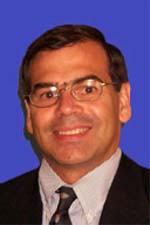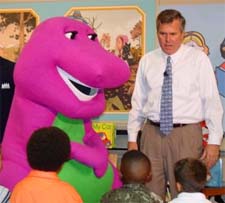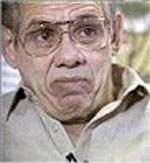
|
By Bill Berkowitz
Most folks would say choose someone who will not spark another Florida controversy. On the other hand, you are a Bush brother; you've got enough hubris not to care. "I have named a person who is one of the finest appellate lawyers in the state," Gov. Bush said. "Above all else, [he] is a man of exceptional character." In his application for the job, the nominee wrote: "As an American whose family escaped a totalitarian (Castro) regime, I have learned to appreciate and defend democratic values and the rule of law. I know the price a society pays when it lacks freedom to speak, freedom to worship, freedom to dissent." The far right Cuban American National Foundation (CANF) - the powerful Cuban exile group that has promoted violence and pushing for stricter restrictions on trade with Cuba is overjoyed. Joe Garcia, the group's executive director calls the appointment "fantastic." Garcia adds, "Gov. Jeb Bush is making the bench look more like the state of Florida." Raoul Cantero III: El Diablo is in the Details Who is Raoul Cantero III, Gov. Bush's appointment to the Florida Supreme Court? The 41-year-old Cantero is a Cuban-American, born in Spain and brought to the U.S. by his parents when he was 9 months old. He is the grandson of the late Cuban dictator Fulgencio Batista, the last of the pre-Castro U.S.-sponsored despots to rule that country. According to Jane Franklin, author of "Cuba and the United States: A Chronological History," in an article posted at Z Net www.zmag.org/content/showarticle.cfm?SectionID=40&ItemID=2049 , Cantero's "father served under Batista as an intelligence officer in the Bureau for the Repression of Communist Activities or BRAC, notorious for torture and assassination."
The Associated Press reported that Cantero wrote a letter to The Miami Herald in 1993 in which he defended anti-abortion protesters, saying: "Abortions kill children." According to the Miami Herald's James, "Cantero was the only nominee among the five finalists who drew considerable controversy. Critics ranging from Miami radio commentator Francisco Aruca to The St. Petersburg Times editorial board urged Bush to bypass Cantero, saying his ties to a militant Cuban exile extremist should disqualify him -- especially at a time when the nation is battling terrorism." Why bring up terrorism when you're talking about a nominee to the state's Supreme Court? Because in light of September 11, it seems inconceivable that anyone who had been involved with known terrorists could be rewarded with such an important appointment. The Bosch File If you haven't heard of Orlando Bosch, you should have. He is one nasty character who has been associated with a number of high-profile terrorist acts. Big-time terrorist acts.
In an editorial, the St. Petersburg Times said that ''Cantero did more than plead and argue the law. He took to talk radio in Miami 13 years ago, when Bosch was facing deportation, to describe him as a 'Cuban patriot.' '' According to Jane Franklin, "Cantero told the media in 1989 that Bosch had never engaged in indiscriminate violence. Evidently Cantero considered blowing up civilians some kind of discriminating violence. According to Cantero, Bosch was conducting 'a counterrevolutionary war.' 'What was considered back then to be a heroic fight against the terrorism of Fidel Castro,' he declared, 'has suddenly come to be seen as anti-American terrorism.'" Cantero and Bush have each declined to talk about the controversy. Here are more details of the Bosch story. According to the chapter on Cuba in William Blum's book, Killing Hope: U.S. Military and CIA Interventions Since World War II, on October 6, 1976, a Cubana Airline blew up in mid flight off Barbados. All the passengers and crewmembers on board - 73 in all were killed, "including the young winners of the Central American and Caribbean Fencing Championship and a group of Guyanese students." Writes Blum: "The main culprits have never been brought to trial or sanctioned. Those who conceived, planned and directed this act of genocide have a long history of terrorism that began in the 1960's under the auspices of the CIA. The role they played in the blowing-up of the Cubana aircraft and the cold-blooded murder of all those on board are well known by the U.S. government. On June 23, 1989, the Department of Justice of that country admitted that it possessed information on the case, which it had kept a secret. "Despite his infamous history, including serious crimes committed on American soil, contrary to the ruling of the Attorney General's Office and in spite of the opposition of major U.S. media, one of these terrorists, Orlando Bosch, has lived in the United States for more than ten years, thanks to a decision by the then-President George Bush." According to an article in Miami New Times (December 20, 2001), Bosch's name, reporter Kirk Neilson writes, "is permanently associated with one of the first acts of airline terrorism." Although he was acquitted of the airline bombing by both a civilian and a military court in Venezuela, "The justice system in Venezuela sentenced two of Bosch's associates, Freddy Lugo and Hernan Ricardo, to twenty years in prison. [They were released in October 1993]…. Luis Posada Carriles, an anti-Castro Cuban who trained with the CIA in the early Sixties and also was charged with planning the bombing, escaped from prison in 1985 and promptly joined the Reagan administration's covert military operations against the Havana-backed Sandinista regime in Nicaragua. "After his last acquittal, Bosch returned to Miami without a visa in 1988. U.S. authorities jailed him because he was wanted for violating parole in 1974 in connection with his conviction for a 1968 bazooka attack on a Havana-bound Polish freighter at the Port of Miami. In 1989, after deeming him a terrorist and a threat to public safety, the first Bush Justice Department decided to deport Bosch but was unable to find a government (other than Cuba) that would accept him. Amid lobbying from Cuban-American political leaders, the Bush administration released Bosch in 1990 after he renounced violence and agreed to be monitored by federal agents." Has Bosch really "renounced violence?" Hardly. Neilson reports that Bosch "was one of nineteen exiles in the Cuban Patriotic Forum who signed a Declaration of Principles published in the Miami Herald" in August 2001. "We recognize and support the right of the Cuban people inside the island and in exile to avail themselves of all means and methods at their disposal in the struggle for the freedom of Cuba," the coalition stated. According to Neilson, in early December, Bosch "admitted to shipping explosives to Cuba." So, in a period defined by his brother's devotion to the cockamamie "war against terrorism," Jeb Bush has the chutzpah to appoint a defender of terrorists to the Florida Supreme Court. You bet he does. And it just doesn't seem right. |
© 1997-2002 BEI
The sexual orientation of individuals pictured in and writers for
Gay Today should not be assumed.
 Raoul Cantero III: Who is this man, and what's his connection to Jeb Bush?
Raoul Cantero III: Who is this man, and what's his connection to Jeb Bush?  Jeb Bush on the campaign trail
Jeb Bush on the campaign trail  Orlando Bosch: Terrorist and friend of the Bushes?
Orlando Bosch: Terrorist and friend of the Bushes?